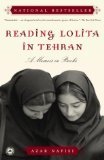All Nonfiction
- Bullying
- Books
- Academic
- Author Interviews
- Celebrity interviews
- College Articles
- College Essays
- Educator of the Year
- Heroes
- Interviews
- Memoir
- Personal Experience
- Sports
- Travel & Culture
All Opinions
- Bullying
- Current Events / Politics
- Discrimination
- Drugs / Alcohol / Smoking
- Entertainment / Celebrities
- Environment
- Love / Relationships
- Movies / Music / TV
- Pop Culture / Trends
- School / College
- Social Issues / Civics
- Spirituality / Religion
- Sports / Hobbies
All Hot Topics
- Bullying
- Community Service
- Environment
- Health
- Letters to the Editor
- Pride & Prejudice
- What Matters
- Back
Summer Guide
- Program Links
- Program Reviews
- Back
College Guide
- College Links
- College Reviews
- College Essays
- College Articles
- Back
Reading Lolita in Tehran MAG
Reading Lolita in Tehran is not your typical memoir. Written by literature professor Azar Nafisi, it is an account of a period in the author's life when she gathered a group of female students to discuss forbidden Western classics in the Islamic Republic of Iran. The severe laws imposed on women lend an urgent purpose to their secret discussions, helping them develop insights into their lives.
Subtitled "A Memoir in Books," this recollection is loosely divided into four sections, each focused on a classical author. Its unconventional structure allows Nafisi to tell stories within a story, which she does through flashbacks.
Skillfully and subtly, Nafisi weaves a teacher's lessons about the essence of great novels and a memoirist's vivid narrative. In one instance, she urges students to see through the government's fervor against F. Scott Fitzgerald's "immoral"novel The Great Gatsby to its central theme of broken dreams, a message that resonates with the politically disenchanted of Iran. By enabling them to relate to The Great Gatsby as well as Austen's Pride and Prejudice and Nabokov's Lolita, she reminds them that "empathy is at the heart of the novel."
Nafisi's memoir showed me a new side of literature. At times, her descriptions of political movements and allusions to obscure novels are confusing and detract from the flow, but overall I recommend this if you have read the works on which Nafisi focuses. If you wish to see how literature can change one's perception of the world, don't miss this book.
Similar Articles
JOIN THE DISCUSSION
This article has 1 comment.


0 articles 0 photos 12292 comments